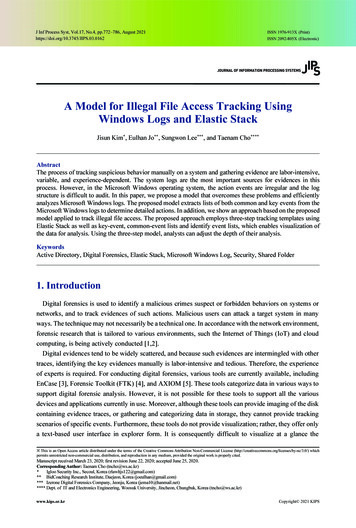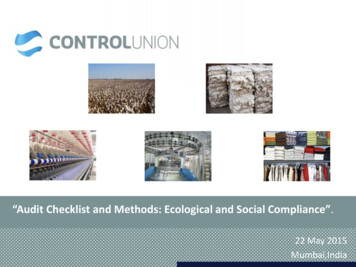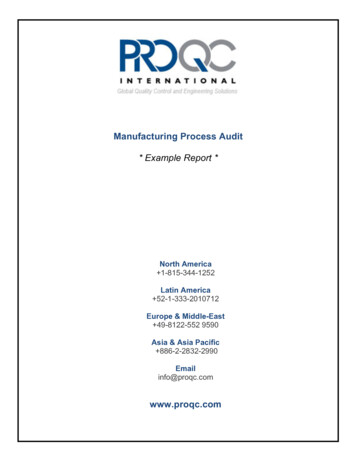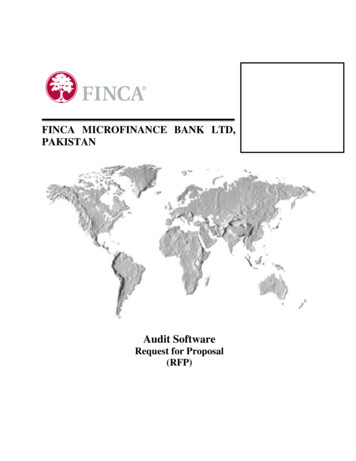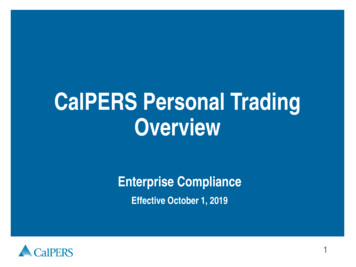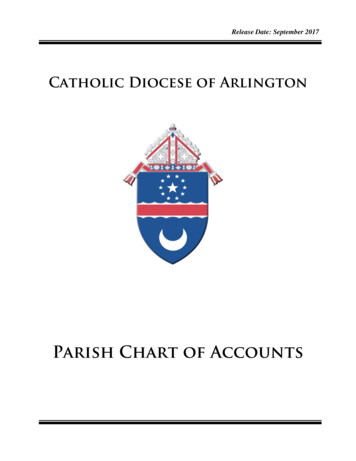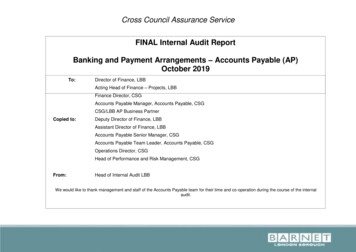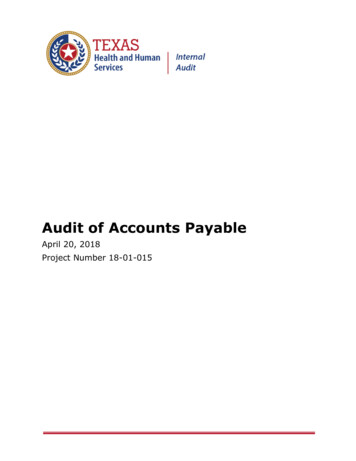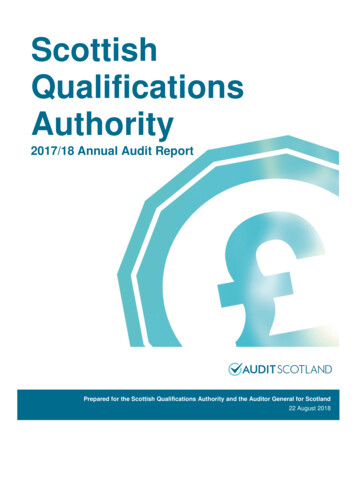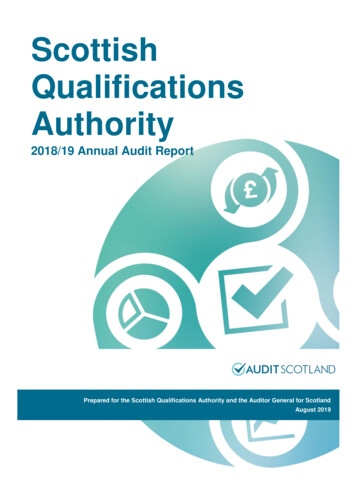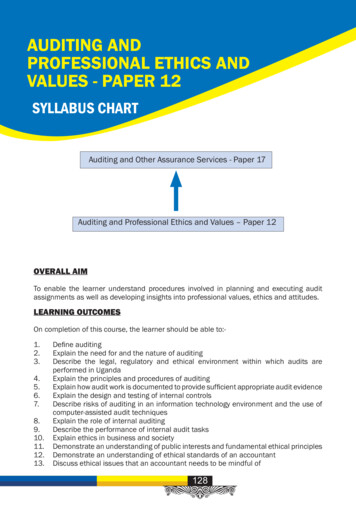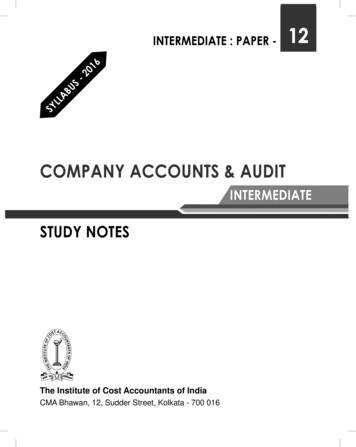
Transcription
12SYLLABUS-2016INTERMEDIATE : PAPER -COMPANY ACCOUNTS & AUDITINTERMEDIATESTUDY NOTESThe Institute of Cost Accountants of IndiaCMA Bhawan, 12, Sudder Street, Kolkata - 700 016
First Edition : August 2016Reprint : April 2017Reprint : January 2018Revised Edition : June 2018Revised Edition : September 2018Revised Edition : February 2019Edition : August 2019Reprint : August 2020Reprint : October 2020Reprint : January 2021Reprint : March 2021Reprint : September 2021Published by :Directorate of StudiesThe Institute of Cost Accountants of India (ICAI)CMA Bhawan, 12, Sudder Street, Kolkata - 700 016www.icmai.inPrinted at :M/s. SAP Print Solutions Pvt. Ltd.28A, Lakshmi Industrial EstateS. N. Path, Lower Parel (W)Mumbai - 400 013, MaharashtraCopyright of these Study Notes is reserved by the Institute of CostAccountants of India and prior permission from the Institute is necessaryfor reproduction of the whole or any part thereof.
Syllabus – 2016PAPER 12 : COMPANY ACCOUNTS & AUDIT (CAA)Syllabus StructureAAccounts of Joint Stock Companies50%BAuditing50%A50%A50%ASSESSMENT STRATEGYThere will be examination of three hours.OBJECTIVESTo gain in depth knowledge of the professional standards, principles and procedures regarding preparation offinancial accounting statements. To provide basic knowledge of auditing.Learning AimsThe syllabus aims to test the student’s ability to: Understand the framework of financial statements, various pronouncements of professional standards and theirapplicability Prepare financial statements as may be required under applicable statutes for fair representation, understandingand reliability of stakeholders Explain basic knowledge of auditingSkill sets requiredLevel B: Requiring the skill levels of knowledge, comprehension, application and analysis.Note: Subjects related to applicable statutes shall be read with amendments made from time to time.Section A : Accounts of Joint Stock Companies1. Accounting of Shares and Debentures2. Presentation of Financial Statements (as per Schedule III)50%25%3. Cash Flow Statement4. Accounts of Banking, Electricity and Insurance Companies5. Accounting Standards (AS - 11, 12, 15, 16, 17, 18 and 19)Section B : Auditing6. Auditing Concepts7. Provision relating to Audit under Companies Act25%50%
SECTION A: ACCOUNTS OF JOINT STOCK COMPANIES [50 MARKS]1.2.Accounting of Shares and Debentures(a)Issue of shares, rights issue, bonus issue, sweat equity shares, forfeiture of share, buy-back of shares(b)Issue and redemption of preference shares, debentures(c)Underwriting of shares and debenturesPresentation of Financial Statements (as per Schedule III)(a)Statement of Profit and Loss(b)Balance Sheet3.Cash Flow Statement (AS - 3)4.Accounts of Banking, Electricity and Insurance Companies5.(a)Accounts of Banking Company(b)Accounts of an Electricity Company(c)Accounts of Insurance CompanyAccounting Standards (AS - 11,12,15, 16, 17, 18 and 19)SECTION B: AUDITING [50 MARKS]6.Auditing Concepts(a)(b)Nature, Scope and Significance of AuditingAudit Engagement, Audit Program, Audit Working Papers, Audit Note Book, Audit Evidence and AuditReport(c)7.Internal Check, Internal Control, Internal Audit - Industry SpecificProvision relating to Audit under Comapnies Act(a)Auditor’s Qualifications, Disqualifications, Appointment, Remuneration, removal, powers and duties(b)Cost Audit, Secretarial Audit(c) Reporting Requirements under Companies Act, Report vs. Certificate, Contents of the reports andqualifications in the report.(d)Miscellaneous Audit(i)Branch Audit, Joint Audit(ii)Audit of Shares and Debentures(iii)Audit of Divisible profits and dividends(iv)Statutory Auditors vs. Internal Auditors(v)Auditing and Assurance Standards relating to audit of inventories and audit of fixed assets(vi)Auditing of different types of undertaking - Education, Hospitals, Co-operative Societies, Banks,Trusts, Municipalities, Panchayats
ContentsSECTION – A : ACCOUNTS OF JOINT STOCK COMPANIESStudy Note 1 : Accounting of Shares and Debentures1.1Introduction11.2Issue of Share31.3Right Issue241.4Bonus Issue261.5Sweat Equity Shares351.6Forfeiture of Shares361.7Buy-back of Shares441.8Issue and Redemption of Preference Shares, Debentures581.9Under Writing of Shares and Debentures101Study Note 2 : Presentation of Financial Statements (As per Schedule III)2.1Introduction1192.2Statement of Profit and Loss1232.3Balance Sheet126Study Note 3 : Cash Flow Statement3.1Introduction1673.2Meaning of Cash and Cash Equivalent1683.3Types of Cash Flow1683.4Indian Accounting Standard (Ind AS) 7195Study Note 4 : Accounts of Banking, Electricity and Insurance Company4.1Accounts of Banking Company2054.2Accounts of Electricity Company2374.3Accounts of Insurance Company251
Study Note 5 : Accounting Standards5.1Introduction3055.2AS 11 : Accounting for the Changes in Foreign Exchange Rates3065.3AS 12 : Accounting for Government Grants3105.4AS 15 : Accounting for Employee Benifits3135.5AS 16 : Borrowing Costs3195.6AS 17 : Segment Reporting3265.7AS 18 : Related Party Disclosure3325.8AS 19 : Accounting for Leases337SECTION – B : AUDITINGStudy Note 6 : Auditing Concepts6.1Nature, Scope and Significance of Auditing6.2Audit Engagement, Audit Programme, Audit Wroking Papers,6.3349Audit Note Book, Audit Evidence and Audit Report375Internal Check, Internal Control, Internal Audit - Industry Specific388Study Note 7 : Provision Relating to Audit under Companies Act (Revised)7.1Auditor’s qualifications, disqualifications, appointment, remunerationremoval, powers and duties4077.2Cost Audit, Secretarial Audit4317.3Reporting requirements under Companies Act, Report vs. Certificate,Contents of the Reports and qualifications in the Report4447.4Miscellaneous Audit477
Section AAccounts of Joint Stock Companies(Syllabus - 2016)
Study Note - 1ACCOUNTING OF SHARES AND DEBENTURESThis Study Note includes1.1Introduction1.2Issue of Shares1.3Right Issue1.4Bonus Issue1.5Sweat Equity Shares1.6Forfeiture of Share1.7Buy-back of Shares1.8Issue and Redemption of Preference Shares, Debentures1.9Under Writing of Shares and Debentures1.1 INTRODUCTIONA company is a voluntary and autonomous association of certain persons with capital divided into numeroustransferable shares formed to carry out a particular purpose in common. It is an artificial person created bylaw to achieve the object for which it is formed. Section 2(20) of the Companies Act, 2013 defines a companyas “Company formed and registered under this Act or an existing company.” An existing company means acompany formed and registered under any of the former Companies Acts. Thus it is an abstract person, invisible,intangible and existing only in contemplation of law. It can hold, purchase or sell both movable and immovableproperty, incur and pay debts, open a bank account in its own name and sue and be sued in the same manneras an individual. Law creates it and law only can dissolve it. Its existence is altogether independent of the life of itsmembers. Members may come and go but the company would go on forever. Transferability of shares has givenperpetual succession to a company. Death, insanity or insolvency of a member or any member will not affect theexistence of the company at all. A company is a legal entity quite distinct and separate from the persons who areits members. A company cannot ordinarily buy its own shares. A shareholder is not the agent of the company. Hecannot incur any debt so as to bind the company. They cannot bind the company by their acts. The same personcan be a shareholder and a creditor of the company. The ownership is divorced from management because ajoint stock company is’ managed by a Board of Directors elected by the shareholders (i.e. owners).Characteristics of a CompanyThe main characteristics of a company are:(i) It is a distinct legal person existing independent of its members(ii) Liability of the members is limited to the extent of the face value of shares held by them.(iii) It has a perpetual succession, i.e, the members of the company may keep on changing from time to timebut this does not affect the company’s continuity.(iv) The shares of a company are freely transferable except in case of a Private limited Company.(v) A company being a legal person is capable of owing, enjoying and disposing of the property in its ownname.(vi) A company, being a separate body can sue and be sued in its own name.THE INSTITUTE OF COST ACCOUNTANTS OF INDIA1
COMPANY ACCOUNTS AND AUDIT(vii) Though a company is an artificial person yet it acts through human beings who are called directors of thecompany. There is a divorce between ownership and the management.(viii) It is a voluntary association of persons usually for profit.Statutory BooksStatutory books are those which a limited company is under statutory obligation to maintain at its registered office.The main statutory books are:(i) Register of Investments held and their names(ii) Register of charges(iii) Register of Members(iv) Register of debenture holders(v) Annual returns(vi) Minutes books(vii) Register of contracts(viii) Register of Directors(ix) Register of shareholdings of the directors(x) Register of loans to companies under the same management(xi) Register of Investment in the shares of other companies.Books of AccountEvery company is required to keep at its registered office books of account.These books are to be maintained in such a way so as to disclose(a) The sums of money received and expended by the company and the matter in respect of which thereceipt and expenditure has taken place.(b) All sales and purchases of goods of the company.(c) All assets and liabilities of the company.Long term Sources of FinanceIssue of ansPloughing back of profitsPreferenceRightsIssueESOS/ESOPTHE INSTITUTE OF COST ACCOUNTANTS OF INDIA
Accounting of Shares and Debenures1.2 ISSUE OF SHARESHARE CAPITALNo trading concern can run without capital. The divisions of share capital are:(i) Nominal or Authorized Capital. The amount of capital with which the company intends to be registered iscalled registered capital. It is the maximum amount which the company is authorized to raise by way ofpublic subscription. There is no legal limit on the extent of the amount of authorized capital.(ii) Issued Capital. That part of the authorized capital which is offered to the public for subscription is calledissued capital.(iii) Subscribed Capital. That part of the issued capital for which applications are received from the public iscalled the subscribed capital.(iv) Called up Capital. The amount on the shares which is actually demanded by the company to be paid isknown as called up capital.(v) Paid up Capital. The part of the called up capital which is offered and is actually paid by the members isknown as paid up capital. The sum which is still to be paid is known as calls in arrears.Publication of Authorized, Subscribed and Paid-Up Capital [Section 60](1) Where any notice, advertisement or other official publication, or any business letter, billhead or letterpaper of a company contains a statement of the amount of the authorised capital of the company, suchnotice, advertisement or other official publication, or such letter, billhead or letter paper shall also containa statement, in an equally prominent position and in equally conspicuous characters, of the amount of thecapital which has been subscribed and the amount paid-up.(2) If any default is made in complying with the requirements of sub-section (1), the company shall be liableto pay a penalty of ten thousand rupees and every officer of the company who is in default shall be liableto pay a penalty of five thousand rupees, for each default.Issue of Application Forms for Securities [Section 33](1) No form of application for the purchase of any of the securities of a company shall be issued unless suchform is accompanied by an abridged prospectus.(2) Provided that nothing in this sub-section shall apply if it is shown that the form of application was issued—(3) in connection with a bona fide invitation to a person to enter into an underwriting agreement with respectto such securities; or(4) in relation to securities which were not offered to the public.(5) A copy of the prospectus shall, on a request being made by any person before the closing of thesubscription list and the offer, be furnished to him.(6) If a company makes any default in complying with the provisions of this section, it shall be liable to apenalty of fifty thousand rupees for each default.Refund of Application Money(1) If the stated minimum amount has not been subscribed and the sum payable on application is notreceived within the period specified therein, then the application money shall be repaid within a periodof fifteen days from the closure of the issue and if any such money is not so repaid within such period,the directors of the company who are officers in default shall jointly and severally be liable to repay thatmoney with interest at the rate of fifteen percent per annum.(2) The application money to be refunded shall be credited only to the bank account from which thesubscription was remitted.THE INSTITUTE OF COST ACCOUNTANTS OF INDIA3
COMPANY ACCOUNTS AND AUDITAllotment of Securities by Company [Section 39](1) No allotment of any securities of a company offered to the public for subscription shall be made unlessthe amount stated in the prospectus as the minimum amount has been subscribed and the sums payableon application for the amount so stated have been paid to and received by the company by cheque orother instrument.(2) The amount payable on application on every security shall not be less than five per cent. of the nominalamount of the security or such other percentage or amount, as may be specified by the Securities andExchange Board by making regulations in this behalf.(3) If the stated minimum amount has not been subscribed and the sum payable on application is notreceived within a period of thirty days from the date of issue of the prospectus, or such other period asmay be specified by the Securities and Exchange Board, the amount received under sub-section (1) shallbe returned within such time and manner as may be prescribed.(4) Whenever a company having a share capital makes any allotment of securities, it shall file with the Registrara return of allotment in such manner as may be prescribed.(5) In case of any default under sub-section (3) or sub-section (4), the company and its officer who is in defaultshall be liable to a penalty, for each default, of one thousand rupees for each day during which suchdefault continues or one lakh rupees, whichever is less.Calls on SharesOut of the face value of the shares, 5% is payable with application, some money will be paid on allotment andrest money will be paid as and when calls are made by the company. Generally the prospectus gives the datesof different calls along with the amount of the calls by shareholders. In case it is not given in the prospectus, thedirectors have the discretion to call it in one call or more than one call. For this a resolution of the Board of Directorsmust be passed and a notice is sent to the shareholders with a request to pay the amount of the call. As soon asa call notice is sent, its particulars are entered in a separate book known as Share Call Book, a specimen of whichis given on the next page.Journal Entries for Issue of Shares(1)On Receipt of Application MoneyBank A/cDr.To Share Application A/c(2)For excess share application money refunded :Share Application A/cDr.To Bank A/c(3) For Share application money transferred to share capitalShare Application A/cDr.To Share Capital A/cTo Securities Premium A/c (if application money includes premium)(4)For Share allotment Money due :Share Allotment A/cDr.To Share Capital A/cTo Securities Premium (if issued at a premium)(5)For Share allotment money received :Bank A/cCalls-in-Arrear A/cDr.Dr. (if allotment money not received)To Share Allotment A/cTo Calls-in-Advance A/c (if call money received in advance along with allotment)4THE INSTITUTE OF COST ACCOUNTANTS OF INDIA
Accounting of Shares and Debenures(6)For Share Call money due :Share Call A/cDr.To Share Capital A/c(7)For Call money received : Bank A/cDr.Call-in-Arrear A/cDr. (if call money not received)Calls-in-Advance A/cDr. (adjustment of share call money received earlier)To Share Call A/cNote: For every subsequent calls, entry no. (6) & (7) share have to be recorded.Illustration 1:PK Ltd. made an issue of 10,00,000 equity shares of 10 each, payable 2 on application, 4 on allotment and 4 on call. All the shares are subscribed and amounts duly received. Pass journal entries to give effect to these.Solution:P K Ltd.JournalsDr.ParticularsBank A/c ’000Dr.Cr. ’00020002000To Equity Share Application A/c(Share application money on 10,00,000 equity shares @ 2 each received)Equity Share Application A/cDr.2,0002,000To Equity Share Capital A/c(Share application money transferred to share capital account as per Board’sresolution no. . dated )Equity Share Allotment A/cDr.4,0004,000To Equity Share Capital A/c(Share Allotment due on 10,00,000 shares @ 4 per share as per Board’sresolution no. dated )Bank A/cDr.4,0004,000To Equity Share Allotment A/c(Allotment money received)Equity Share First and Final Call A/cDr.4,0004,000To Equity Share Capital A/c(Share 1st and Final Call due on 10,00,000 shares @ 4 share as per Board’sresolution no. dated )Bank A/cTo Equity Share First and Final Call A/cDr.4,0004,000(For shares First and Final Call money received on 10,00,000 shares @ 4 pershare)THE INSTITUTE OF COST ACCOUNTANTS OF INDIA5
COMPANY ACCOUNTS AND AUDITWhen Both Preference and Equity Shares are IssuedWhen a company issues both preference and equity shares then it is desirable that the entries for applicationmoney, allotment money and calls money should be separately passed for each type of share capital. The wordEquity or Preference must invariably be used in all the circumstances.Issue of Shares for Purchase of AssetsIf the shares have been allotted to any person or firm from whom the company has purchased any asset, thefollowing entry will be passed:Asset AccountDr.To Share Capital Account(Being . shares allotted in consideration of purchase of an asset for the company)This fact should also be disclosed in the Balance Sheet while showing the issued, subscribed and paid up capital.Issue of Shares at PremiumA company may issue shares at a premium, i.e., at a value greater than its face value. The power to issue shares ata premium need not be given in the Articles of Association. Premium so received shall be credited to a separateaccount called Securities Premium Account.Section 52 of the Companies Act, 2013 gives the purposes for which share premium account may be applied bythe company. These are:1. For the issue of fully paid bonus shares to the members of the company;2. For writing off preliminary expenses of the company;3. For writing off the expenses of the commission paid or discount allowed on any issue of shares or debenturesof the company; and4. For providing premium payable on the redemption of any redeemable preference shares or debenturesof the company.5. For the purchase of its own shares or other securities u/s 68.Illustration 2:AB & Co. Ltd. issued 5,00,00,000 Equity shares of 10 each at a premium of 4 per share payable 1 per shareon application, 6 per share on allotment (including premium), 3 on first call and the balance on final call. Theshares were all subscribed and all money due was received except the first call money on 1,00,000 shares and theFinal call money on 1,50,000 shares.Give the Cash Book and Journal entries to record the above transactions.Solution:Dr.CASH BOOKCr. in LakhTo Equity Share ApplicationTo Equity Share AllotmentTo Equity Share 1st CallTo Equity Share Final Call6 in Lakh5003,0001,497By Balance c/d6,9911,9946,9916,991THE INSTITUTE OF COST ACCOUNTANTS OF INDIA
Accounting of Shares and DebenuresJournalsDr. In LakhParticularsCr. In LakhEquity Share Application A/cTo Equity Share Capital A/cDr.500Equity Share Allotment A/cTo Equity Share Capital A/cTo Securities Premium A/cDr.3,000Equity Share First Call A/cTo Equity Share Capital A/cDr.1,500Calls in Arrear A/cTo Equity Share First Call A/cDr.3Equity Share Final Call A/cTo Equity Share Capital A/cDr.2,000Calls in Arrear A/cTo Equity Share Final Call A/cDr.65001,0002,0001,50032,0006Prohibition on Issue of Shares at Discount [Section 53]1. Except as provided in section 54, a company shall not issue shares at a discount.2. Any share issued by a company at a discounted price shall be void.3. Where a company contravenes the provisions of this section, the company shall be punishable with finewhich shall not be less than one lakh rupees but which may extend to five lakh rupees and every officerwho is in default shall be punishable with imprisonment for a term which may extend to six months or withfine which shall not be less than one lakh rupees but which may extend to five lakh rupees, or with both.NO SHARES CAN BE ISSUED AT A DISCOUNTAdjustment of Excess Money towards the Amount due on the Allotment and CallsSometimes a Company may not allot all the shares for which applications have been received. Because of oversubscription, allotment is either made of less number of shares or on pro-rata basis. For example, if the companyoffered 100,00,000 shares of 10 each but applications for 2,00,00,000 shares were received by company. Thedirectors sent letters of regret to applicants of 50,00,000 shares and applicants of 150,00,000 shares were allottedthe 100,00,000 shares on pro-rata basis. In such a case, application money of 50,00,000 shares will be adjustedeither on allotment and on calls, if there is still surplus money after adjusting the allotment and call money due fromshareholders it will be refunded in cash.Illustration 3:B Ltd issued 2,000 shares of 100 each at a premium of 10% payable as follows:On application 20 (1st April 2014) . On allotment 40 (including premium) (1st June 2014) . On First Call 30 (1stJuly 2014). On Second & Final call 20 (1st Aug 2014).Applications were received for 1,800 shares and the directors made allotment in full. One shareholder to whom40 shares were allotted paid the entire balance on his share holdings with allotment money and another shareholder did not pay allotment and 1st call money on his 60 shares but which he paid with final call. Interest shouldbe received @ 5% p.a. on calls-in-arrears and interest should be paid @ 6% p.a. on calls in Advance (as per Articlesof the company).THE INSTITUTE OF COST ACCOUNTANTS OF INDIA7
COMPANY ACCOUNTS AND AUDITRequired: Calculated the amount of interest paid and received on calls -in- advance and calls in arrearsrespectively on 1st Aug.2014.Solution:Calculation of Interest on Calls-in-advanceOn 1200 (i.e. 40 30) for 1 months @ 6% p.a. 6On 800 (i.e. 40 20) for 2 months @ 6% p.a. 8 14On 2400 (i.e. 60 40) for 2 months @ 5% p.a. 20On 1800 (i.e. 60 30) for 1 months @ 5% p.a. 7.5 27.5Calculation of Interest on Calls-in-arrearsIllustration 4:A limited Company was registered with a capital of 5,00,000 in share of 100 each and issued 2,000 such sharesat a premium of 20 per share, payable as 20 per share on application, 50 per share on allotment (includingpremium) and 20 per share on first call made three months later. All the money payable on application, andallotment were duly received but when the first call was made, one shareholder paid the entire balance on hisholding of 30 shares, and another shareholder holding 100 shares failed to pay the first call money.Required: Give Journal entries to record the above transactions.Solution:JournalParticularsL.F.Bank A/cDr.Dr. Amount Cr. Amount 40,00040,000To Share Application A/c[Being the issue of 2,000 shares and application money received @ 20 pershare]Share Application A/cDr.40,00040,000To Share Capital A/c[Being the transfer of application money on 2,000 shares @ 20 per share toShare Capital A/c)Share Allotment A/cDr.To Share Capital A/cTo Securities Premium A/c(Being the allotment money on 2,000 shares @ 50 including premium madedue)Bank A/cDr.1,00,00060,00040,0001,00,0001,00,000To Share Allotment A/c(Being the allotment money on 2,000 shares @ 50 per share received)Share First Call A/cDr.40,00040,000To Share Capital A/c(Being the first call money on 2,000 shares @ 20 per share made due)8THE INSTITUTE OF COST ACCOUNTANTS OF INDIA
Accounting of Shares and DebenuresBank A/c38,900Dr.38,000To Share First Call A/c900To Call-paid-in-advance A/c(Being the first call money on 1,900 shares @ 20 per share and share Secondcall money on 30 shares @ 30 per share received)Calls in Arrear A/cDr.2,000To, Share First Call A/c2,000(Being the first call money for 100 shares is in arrear)Illustration 5:B Ltd purchase the assets of 10,80,000 from C Ltd. The consideration was payable in fully paid equity shares of 100 each.Required: Show the necessary journal entries in books of B Ltd. assuming that —a. Such shares are issued at parb. Such shares are issued at premium of 20%Solution:JournalParticularsL.F.Dr.Cr.Amount ( )Amount ( )Entry in all casesSundry Assets A/cDr.10,80,00010,80,000To C Ltd.[Being the purchase of assets from Y Ltd. as per agreement dated.)Case (a) When Shares are issued at parC Ltd.Dr.10,80,000To Equity Share Capital A/c10,80,000(Being the issue of 10,800 shares at par to C Ltd. as per agreement dated.)Case (b) When Shares are issued at a premium of 20%C Ltd.Dr.10,80,000To Equity Share Capital A/c9,00,000To Securities Premium A/c1,80,000(Being the issue of 9,000 shares at 20% premium to C Ltd. as per Board’sResolution no. dated.)THE INSTITUTE OF COST ACCOUNTANTS OF INDIA9
COMPANY ACCOUNTS AND AUDITWorking Note:Calculation of No. of Shares to be issued in different casesA. Amount to be paid ( )At ParAt a Premium10,80,00010,80,00010012010,8009,000B. Issue Price Per Share ( )C. No. of Shares to be issued (A/B)Illustration 6:D Ltd. issued 2,000 shares of 100 each credited as fully paid to the promoters for their services and issued 1,000shares of 100 each credited as fully paid to the underwriters for their underwriting services. Journalise oodwill A/cDr.Cr.Amount Amount Dr.2,00,0002,00,000To Share Capital A/c(Being the issue of 2,000 shares of 100 each at par to promoters as perBoard’s Resolution no. dated.)Underwriting Commission A/cDr.1,00,000To Underwriter’s A/c1,00,000(Being the Underwriting commission due on shares)Underwriter’s A/cDr.To Share Capital A/c1,00,000(Being the issue of 1,000 shares of 100 each at par to Underwriters as per theBoard’s Resolution no. dated.)1,00,000Illustration 7:On 1st May 2014 Superman Ltd. issued 5,000 Equity Shares of 100 each payable as follows: On application20On 1st Call20(Last date fixed for payment 31st July)On allotment30On Final Call30(Last date fixed for payment 30th August)Applications were received on 15th May 2014 for 6,000 shares and allotment was made on 1st June 2014.Applicants for 2,500 shares were allotted in full, those for 3,000 shares were allotted 2,500 shares and applicationsfor 500 shares were rejected.Balance of amount due on allotment was received on 15th June.The calls were duly made on 1st July, 2014 and 1st August 2014 respectively. One shareholder did not pay the 1stCall money on 150 shares which he paid with the final call together with interest at 5% p.a. Another shareholderholding 100 shares did not pay the final call money till end of the accounting year which ends on 31st October.10THE INSTITUTE OF COST ACCOUNTANTS OF INDIA
Accounting of Shares and DebenuresRequired: Show the Cash Book and Journal Entries.Solution:Journal ProperDr.Date1.6.14ParticularsEquity Share Application A/cL.F.Dr.( )Cr.( )1,10,000To Equity Share Capital A/c1,00,000To Share Allotment A/c10,000(Being the transfer of application money @ 20 per share on 5,000shares transferred to Share Capital A/c and @ 20 on 500 t/f to ShareAllotment A/c)1.6.14Equity Share Allotment A/cDr.1,50,000To Equity Share Capital A/c1,50,000(Being allotment money due on 5000 shares @ 30 per share1.7.14Equity Share First Call A/cDr.1,00,000To Equity Share Capital A/c1,00,000(Being 1st call money due on 5000 shares @ 20 per share1.8.14Calls-in-Arrear A/cDr.3,000To Equity Share first call A/c3,000(Being the non receipt of 1st call money on 150 equity shares @ 20each transferred to calls-in-Arrear A/c)1.8.14Equity Share Final Call A/cDr.To Equity Share Capital A/c1,50,000(Being final call money due on 5000 shares @ 30 per share30.8.14Shareholders A/c1,50,000Dr.2525To Interest on calls-in-arrear(Being the interest due on first call on 300 @ 5% for two months, assumedpayment made on 30.8.121.09.14Calls-in-Arrear A/cDr.3,0003,000To Equity Share Final Call A/c(Being the transfer to calls-in-Arrear A/c final call money on 100 equityshares @ 30 per shares)31.10.14Shareholders A/cTo Interest on Calls-in-Arrears A/cDr.2525(Being the interest due on 3,000 @ 5% for two months)THE INSTITUTE OF COST ACCOUNTANTS OF INDIA11
COMPANY ACCOUNTS AND AUDITDr.Cash Book (Bank Column)DateParticulars15.5.14To Equity ShareApplication A/c(Application money @ 20 pershare on 6,000 shares)15.6.14 To Equity Share Allotment A/c(Balance of allotment money)31.07.14 To Equity Share 1st Call A/c(1st Call money on 4,85030.08.14 shares)To Equity Share Final A/c(Finalcall moneyon30.08.14 4,900 Shares)To Calls-in-Arrear A / c(Arrear of 1st Call money @ 20 per Share on 1,50 Shares)1.9.14Shareholders A/c(Interest o n 3,000 for twomonths @ 5% p.a.)Cr.Date 1,20,00001.6.141,40,00031.10.14Particulars By Equity ShareApplication A/c (Refund of
COMPANY ACCOUNTS & AUDIT The Institute of Cost Accountants of India CMA Bhawan, 12, Sudder Street, Kolkata - 700 016 SYLLABUS - 2016. First Edition : August 2016 . Audit Program, Audit Working Papers, Audit Note Book, Audit Evidence and Audit Report (c) Internal Check, Internal Control, Internal Audit - Industry Specific
